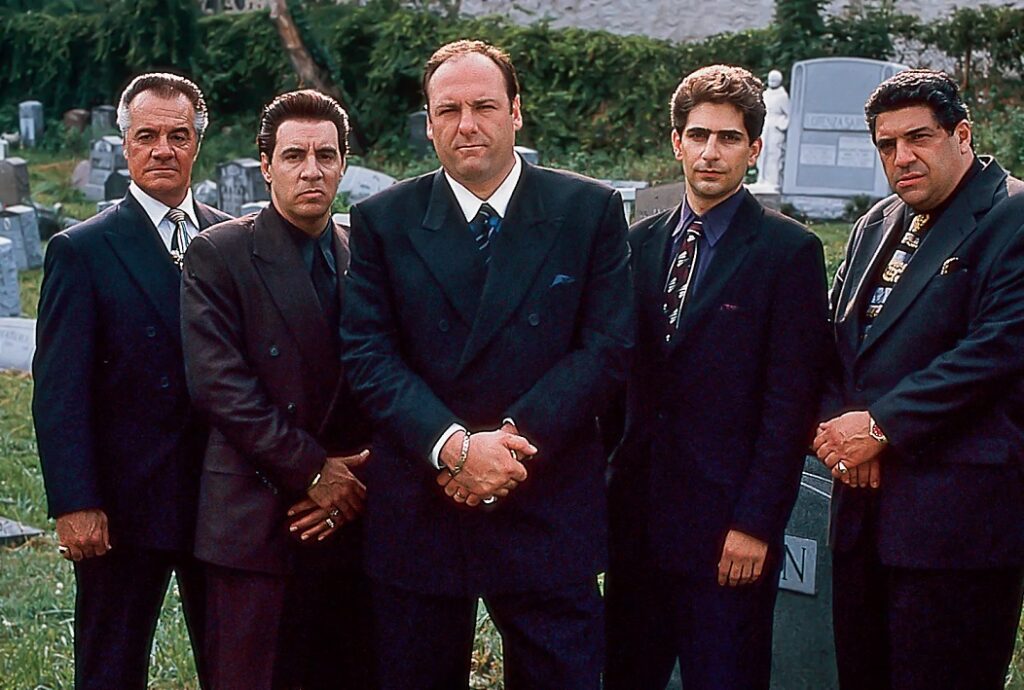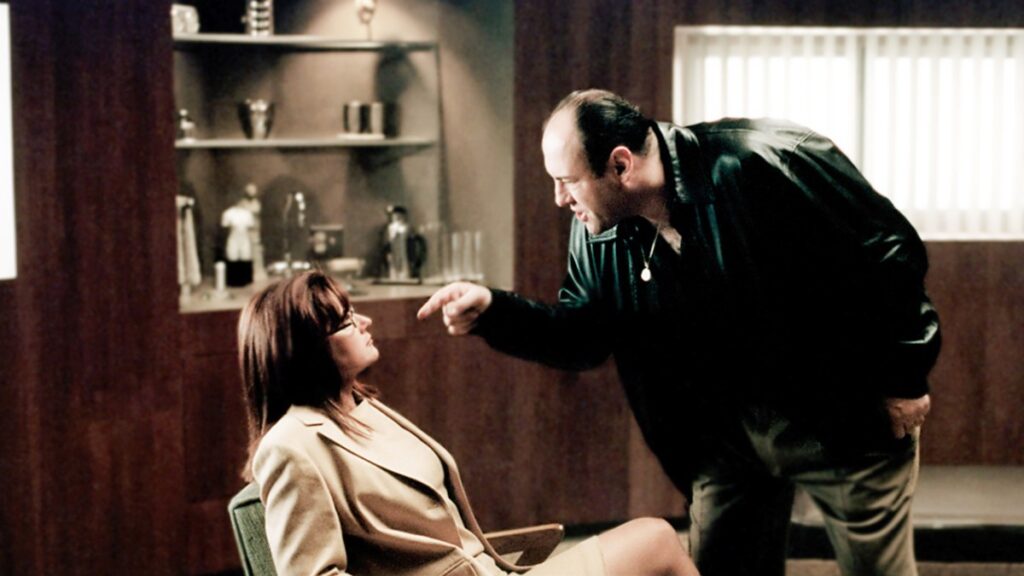
When Does The Sopranos Get Good?
Fans of The Sopranos say they were instantly hooked by the in-depth and personal storyline of Tony Soprano right from the start. While the show can be slow at times, especially when focused a bit too much on Tony’s therapy, most fans argue these scenes and episodes are crucial in the overall plot.
What Fans Say:
Fans of The Sopranos appreciate its realistic portrayal of mob life, combined with deep character exploration that transcends typical crime drama tropes. Many are drawn to the series’ unfiltered look at Tony’s psychological struggles, appreciating how his sessions with Dr. Melfi reveal his vulnerabilities and the inner conflicts of a man torn between power and guilt. Fans also praise the show’s dark humor, memorable characters like Carmela, Christopher, and Paulie, and the way it deftly intertwines family drama with crime narratives. For many, The Sopranos is a masterclass in writing and character development, setting a new standard for television.
What Haters Say:
Some detractors feel The Sopranos can be slow-paced, especially during episodes focused heavily on Tony’s therapy sessions. The series’ deliberate pacing, while seen as nuanced by fans, is sometimes criticized for dragging down the narrative flow. Additionally, some viewers find the show’s open-ended finale frustrating, feeling it left too many questions unanswered. Others have pointed out that the graphic violence and moral ambiguity make it difficult to empathize with characters, particularly when the series highlights the darker aspects of Tony’s character and choices.
Does the Show Fall Off in Quality at Any Point?
Most fans agree that The Sopranos maintained a high level of quality throughout its run, though some critics and fans note a slight decline in momentum during its final season. While earlier seasons focused heavily on character-driven narratives, the final season faced mixed reactions due to its introspective approach and the shift toward philosophical questions about identity and mortality. Some viewers felt certain storylines, like Christopher’s movie-making aspirations, deviated from the main arc, while others appreciated the more reflective tone as a natural evolution of the series. The series finale, however, remains particularly controversial, as its ambiguous ending left fans divided over Tony’s fate.
Aggregated Critic Commentary:
| Season | Rotten Tomatoes Score | IMDb Average Score |
|---|---|---|
| Season 1 | 96% | 9.2 |
| Season 2 | 97% | 9.2 |
| Season 3 | 97% | 9.3 |
| Season 4 | 89% | 9.2 |
| Season 5 | 92% | 9.2 |
| Season 6A | 93% | 9.2 |
| Season 6B | 98% | 9.3 |
Critics largely regard The Sopranos as a television masterpiece. The show has been praised for its pioneering approach to storytelling, seamlessly blending crime drama with dark comedy and psychological depth. Critics commend David Chase’s visionary approach, which set a precedent for the “antihero” trope in television, influencing later shows like Breaking Bad and Mad Men. James Gandolfini’s performance as Tony Soprano is often highlighted as a career-defining role, bringing complexity to a character who is both charismatic and morally corrupt.
The series also earned accolades for its realistic portrayal of suburban life and the Italian-American experience, examining the tension between personal identity and societal expectations. Critics recognize that The Sopranos paved the way for serialized television, helping to establish HBO as a home for high-quality drama. While the final season received mixed reviews due to its unconventional pacing and philosophical themes, the show as a whole remains critically acclaimed and celebrated for its influence on modern television.
Overview of The Sopranos:
The Sopranos, created by David Chase, premiered on HBO in 1999 and quickly became a defining show of the modern television era. This crime drama centers on Tony Soprano, a mob boss in New Jersey, as he balances the pressures of running his crime family with the challenges of his personal life. The show is notable for its psychological depth and complex character portrayals, particularly Tony’s struggle with mental health, explored through his sessions with therapist Dr. Jennifer Melfi. This unique blend of crime drama and psychological exploration sets The Sopranos apart from traditional mob shows, giving audiences a glimpse into the conflicted psyche of a man living a double life.
Over six seasons, The Sopranos delves into themes of family, loyalty, power, and identity, depicting Tony’s relationships with his family, friends, and fellow mobsters. The show doesn’t shy away from showing the violence and moral ambiguity of Tony’s world, often using dark humor and ironic twists to drive home its social commentary. With its cinematic production values, intricate writing, and top-tier performances (especially by James Gandolfini as Tony Soprano), The Sopranos is widely credited for elevating the standards of television storytelling. Its influence is evident in countless subsequent shows that explore complex antiheroes and moral gray areas.
While some viewers found its controversial, ambiguous finale polarizing, The Sopranos’ legacy as a groundbreaking series remains unshaken. It won numerous awards and remains a favorite among fans and critics for its rich storytelling, memorable characters, and the nuanced depiction of organized crime and its impact on those involved.
Season Highlights
Season 1: The debut season introduces Tony Soprano, a mob boss dealing with panic attacks, who seeks therapy with Dr. Jennifer Melfi. This season establishes key characters and Tony’s internal conflict between his crime family and his home life with Carmela and their two children, Meadow and A.J. Memorable moments include the assassination attempt on Tony, Junior’s machinations, and Tony’s handling of his mother, Livia, who subtly plots against him. Season 1 sets the tone for the show’s unique blend of psychological depth and mob drama.
Season 2: Season 2 sees the return of Tony’s childhood friend Richie Aprile, whose violent tendencies and power ambitions create friction within the family. Tony’s nephew, Christopher, begins pursuing a career in screenwriting, leading to comedic and tense moments. The season also explores Tony’s deepening relationship with his sister Janice and his troubled marriage to Carmela. The season finale is significant, with the dramatic showdown between Tony and Richie, marking a turning point for Tony’s control over his empire.
Season 3: This season focuses on the FBI’s intensifying investigation into Tony’s operations, adding an element of suspense. Meanwhile, Meadow’s relationship with Jackie Aprile Jr. introduces conflict into Tony’s personal life. Ralph Cifaretto becomes a major antagonist, clashing with Tony and displaying a particularly cruel streak. Season 3 is also known for exploring themes of loyalty and betrayal, with standout moments including the brutal confrontation between Tony and Ralph. The season delves deeper into Tony’s psyche, especially his evolving relationship with Dr. Melfi.
Season 4: In Season 4, tensions rise as Carmela becomes increasingly frustrated with Tony’s infidelity and their financial issues, leading her to question their marriage. Ralph’s cruelty and disregard for hierarchy culminate in his violent demise at Tony’s hands. Meanwhile, Christopher’s addiction spirals, affecting his role in the family. This season is notable for its focus on the Soprano family dynamics, particularly Tony’s strained marriage, and Carmela’s moral conflict about her complicity in Tony’s criminal lifestyle.

Season 5: With mobster heavyweights released from prison, Tony faces new challenges as these returning members disrupt the existing order. Tony’s cousin, Tony Blundetto, becomes a source of tension as he seeks to return to mob life, testing Tony’s loyalty. This season also marks a turning point for Christopher, who struggles with sobriety and loyalty to Tony. As tensions escalate with rival crime families, Season 5 ramps up the stakes, leading to a bloody and tragic conclusion.
Season 6 (Parts 1 & 2): The final season explores themes of mortality and legacy as Tony grapples with existential questions about his life and his role as a mob boss. A near-death experience forces him to reevaluate his relationships and choices. Carmela pursues her real estate ambitions, while Christopher’s substance abuse creates new problems. The FBI investigation closes in, leading to the arrests of key characters. The show’s infamous finale left viewers with an ambiguous ending, sparking debates and analysis for years to come. This season reflects on the series’ recurring themes, ultimately ending Tony’s story on a contemplative and unresolved note.
Similar Shows
- Boardwalk Empire
- Mad Men
- Breaking Bad
- Ray Donovan
- The Wire
If You Liked These, You’ll Like “The Sopranos”
- Boardwalk Empire – With similar themes of crime, power, and family, this series captures the gritty underbelly of organized crime in Prohibition-era Atlantic City.
- Mad Men – Known for its exploration of complex characters and moral ambiguity, Mad Men dives into the inner lives of antiheroes in a high-stakes, morally gray profession.
- Breaking Bad – This show follows a similar path of moral corruption, featuring an antihero’s descent into the criminal underworld.
- Ray Donovan – Focused on a morally conflicted “fixer” for a law firm, this show features a strong central character and dark themes of family and crime.